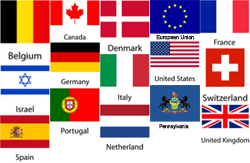2014 Conference - 11/22/14 to 11/26/14 This year our conference will be held at St Regis Grand Rome hotel in Rome, Italy. We had a great turnout in 2013 and look forward to another this year. We have arranged special accommodations for those who would like to attend. We have several gold and silver level sponsorship opportunities available as well.
 Studying agenda-setting and policy dynamics through financial information is a well-established discipline and research tradition that dates back many years. A close examination of these dynamics provides many insights to how changes in fiscal policies and practice can affect the overall political and financial climate of a nation, or group of nations on a global level. With the current global economic crisis and all that countries in Eurozone must do to crawl out of the put that has created the need for austerity measures, and what all players in the global economy must do in order to ensure the best outcome for every nation involved.
Studying agenda-setting and policy dynamics through financial information is a well-established discipline and research tradition that dates back many years. A close examination of these dynamics provides many insights to how changes in fiscal policies and practice can affect the overall political and financial climate of a nation, or group of nations on a global level. With the current global economic crisis and all that countries in Eurozone must do to crawl out of the put that has created the need for austerity measures, and what all players in the global economy must do in order to ensure the best outcome for every nation involved.
It is comparative analysis of financial agendas internationally that allows for an individual or group of individuals to understand why issues arise in their respective countries and why policy made abroad that affects their ability to work, their responsibility to pay taxes matters on is necessary when examined on a macro or microeconomics scale.
And comparative analysis proves quite informational. To know a country is sixth in a region for GDP per capital means that a person can be aware that their salary and general benefits are affected for the better over a worker in another country in a similar position. To know that a country or region has a high PPP means that a person or group can rest assured that their currency has buying power, and that the raw imports, goods and services they depend on will be plentiful.
Informed individuals and groups can also make demands from their representative governments that better suit their needs by staying abreast of financial issues and being vocal about how the issues are impacting their day-to-day lives. They can attract more individuals of a like mind to their interest group by having reasonable discussions about the issues at hand. Expanding understanding of the scope of conflict, those who are impacted by issues can help shape the light in which they are discussed, instead of being subject to the demands of overrepresented interest groups and those who would seek to set agendas for reasons solely for the sake of political and personal gain.
Individuals can also examine the discourse that governments are currently releasing to the public in order to see what issues are on the table and most likely to change at any given time by staying connected to established information channels.
